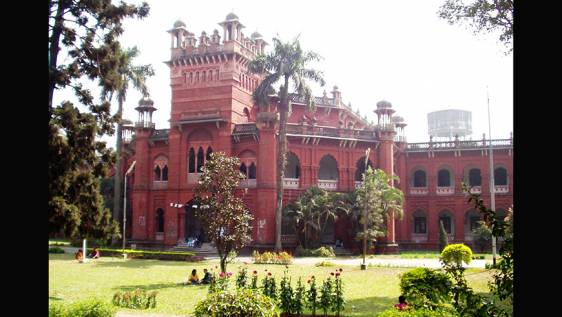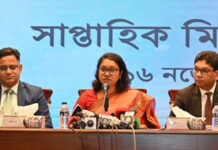Nearly 50% students in the various science related departments in the Dhaka University manage to finish their graduation in the stipulated time, while the rest either fall behind or change their discipline of study altogether for various reasons.
A total of 140 students enrolled in the physics department under the science faculty in 2008-09 academic session. However, only 61 of them successfully finished their graduation after the stipulated four years.
The faculty and the department offices only have information about the students that pass out successfully; but do not have any idea or record about those who leave the department or drop out.
Talking to some of the students from that batch, the Dhaka Tribune has learnt that 15 of their classmates attended fresh admission tests and joined other departments. Of the remaining 64, a handful dropped out while most others failed to pass the year final examinations and fell back.
In the same academic session, 75 students got admission in the botany department under the Biological Sciences Faculty. Only 32 of them passed the honours final examination successfully in the stipulated four years’ time. Among the rest, 20 changed their departments and 23 failed in the various year final examinations.
A number of students and teachers of these department have said there are several reasons for this low percentage of emergence.
For those who pass the High Secondary Certificate (HSC) examinations with science major, Buet and the public medical colleges are the top priorities for higher education. Most of those who fail to get admission in Buet or the med schools, join the science disciplines at the Dhaka University. Some of these students reattempt the engineering and medical admission examinations, come out successful and leave the DU.
There are other students, who, after doing a few classes in the science subjects, decide to migrate to the various departments under the Arts, Commerce and Social Sciences Faculties. Some of them decide to do so because they realise that the subject they have chosen is not right for them.
Disciplines like pure or theoretical physics and chemistry are mainly meant for those who wish to do research in future. However, since there is very limited scope of research in DU, or for that matter anywhere else in Bangladesh, many students realise that they will have to go abroad for doing research. Those who do not have the financial means to go abroad, often have to settle for teaching jobs at schools, colleges and universities – a choice which conflicts with the ambitions of many students. Many students explore alternate education options when they realise this.
Professor Anwar Hossain from the microbiology department told the Dhaka Tribune: “These departments are fully research oriented. But we do not have much job opportunity to attract the students. Most pharmaceutical companies taking product patent from outside and produce drugs. They do not have research and development wings.
“On the other hand, the government research institutes such as BCSIR and Nuclear Energy Commission do not have sufficient funds to engage DU science students for handsome salaries. When a student started to realise these barriers, they get frustrated,” Professor Anwar said.
The heavy load of study also discourages many students. In some of the departments, students have to remain busy with classes and practical sessions for six to seven hours a day. Moreover, the syllabi are immense in size. Those who cannot cope up with the pressure often seek admission in the departments under the other faculties because of the common perception that life is much easier in the departments under the Arts, Commerce and Social Sciences faculties.
SM Imamul Haque, professor of the Soil, Water and Environment department, said: “We are having this students through a weak admission system. Only the GPA of SSC, HSC and an MCQ-based admission test cannot judge a student properly. We also have to know about his communication skills and extracurricular activities. So, we need a change in the admission system to find the best students.”
Professor Yousuf Ali said: “Students study science with the help of private tutors, coaching centre and guidebooks at the line in secondary and higher secondary education levels.
As a result, they do not get the strong base needed for pursuing science subjects. Eventually, when they get admitted to the university, they cannot cope up with the vast and comparatively hard syllabus.”
On the contrary, students accuse some of the teachers of insincerity. Some of them alleged that many teachers neglect their duties at the public universities and pay more attention to their engagements with private universities because they get better payments there.
Tofial Azam, a postgrad student of statistics, told the Dhaka Tribune: “Shortage of adroit teachers is the main reason behind students failing to get promotion. Moreover, the fact that there is very little subject-related job in the market also hamper the students’ interests in studying.”
Nasreen Ahmed, pro vice-chancellor (education) of DU, said: “The authority often raise these points for discussion at the meeting of the deans’ committee. But the deans of the various faculties never discuss these issues in the forum. I will try to find out more about the alarming pass rate.”
Educationist Jamilur Reja Chowdhury said: “Students who are doing well in engineering and anywhere else come through the existing secondary and higher secondary education system. So, we cannot accuse students. Teachers have to find the reason why students are changing departments and why they cannot pass in the examinations.”
Source: Dhaka Tribune










